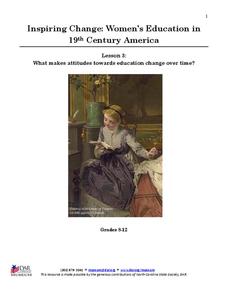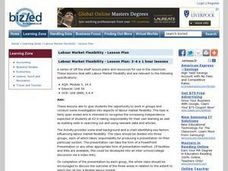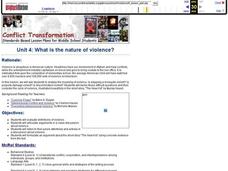Curated OER
Social Studies: Bridging the Gap Between Cultures
Have you special education class examine multiculturalism. By exploring the cultures of Israel and Greece, they discover the holidays, cuisine, arts, andgeography of the countries. During this twelve-week unit, students develop a...
Virginia Department of Education
Biotechnological Issues and Bioethics
Culminate a bioethics unit with the implementation of a lesson that incorporates the Socratic method to encourage class feedback and participation. Pupils participate in a discussion on bioethics and morality, complete a writing seminar,...
National Society Daughters of the American Revolution
Lesson 3: What Makes Attitudes Towards Education Change over Time?
The struggle for women's rights is not unique to this generation, or even to the 20th century. Class members explore the conflicting opinions of Alexander Graham Bell and his wife, Mabel Hubbard Bell, regarding women's pursuits of higher...
Breaking News English
The World Is 0.28% More Peaceful Than a Year Ago
Some days, the world seems like it is becoming darker, but research suggests that the world might actually be becoming a more peaceful place. An informational reading passage accompanied by a series of activities builds English language...
University of California
The Civil War: Strategies and Battles
Was it the War against Northern Aggression or the War to Unify the Union? Scholars investigate the key battles and strategies of the American Civil War to determine just why the North was victorious in the end.
University of California
The Civil War: Perspective
Confederate soldiers saw the Civil War much differently than their Union counterparts. Scholars analyze the perspective of the Civil War from the viewpoint of various key figures in the fourth installment of an eight-part series. By...
University of California
The Civil War: Emancipation
Investigate and analyze Abraham Lincoln's Emancipation Proclamation using primary and secondary sources. The sixth installment of an eight-part series analyzes the meaning of Lincoln's document in relation to its impact on the Civil War.
University of California
Decolonization
The ripple effect from one small event can impact many others. Young historians research the ripple effect World War II had on decolonization in the second installment of an eight-part series. Through primary and secondary documents as...
University of California
Containing Communism Abroad
Learn more about the policy of the United States to contain communism during the Cold War. The fifth installment of an eight-part series looks at primary and secondary materials about a challenging time in history. After analyzing the...
PBS
Evaluating Conflicting Evidence: Sultana
What sunk the Sultana? Scholars become investigators to uncover the facts behind the 1865 sinking just after the end of the Civil War. Through group work, videos, and primary documents, they research and analyze why 1,800 men died....
Howard Hughes Medical Institute
Natural and Artificial Selection
Many people oppose genetically modified foods yet support selective breeding in dogs. Learn about the similarities and differences through a short presentation that features many video clips. It covers natural selection, artificial...
NET Foundation for Television
1850-1874 The Kansas-Nebraska Act
How the Kansas-Nebraska Act created Bleeding Kansas is complicated—until scholars research and examine documents from the time. After completing activities that include mapping, photo, document analysis, and discussion, learners...
PBS
The Supreme Court: Early Civil Rights Cases Facing the Supreme Court
Imagine being an ex-slave after the Civil War and not understanding if you were considered a citizen of the United States. Scholars analyze the early Supreme Court battles in civil rights cases and especially the Fourteenth Amendment....
State Bar of Texas
Worcester v. Georgia
Can the president of the United States defy the rulings of the Supreme Court? Students investigate the case of Worcester v. Georgia and the impact it had on society and, most importantly, Native Americans. Using a short video clip as...
State Bar of Texas
Roe v. Wade
At what point does the right of privacy end and the government begin? Scholars research rights under the Ninth Amendment to the Constitution. Using the 1973 Roe v. Wade Supreme Court case as a starting point, along with small group work...
College Board
2014 AP® English Language and Composition Free-Response Questions
For some students, college may not be worth the cost. Free-response questions from the 2014 AP® English Language and Composition exam cover a variety of topics, including the value of a college education. Writers review six sources to...
The New York Times
Where to Draw the Line: Balancing Government Surveillance with the Fourth Amendment
The question of how to balance Fourth Amendment Rights with national security concerns becomes critical in an age of planned terrorist attacks, election interference, and fake news. Get young social scientists involved in the debate with...
Anti-Defamation League
‘Migrant Caravan’ and the People Seeking Asylum
The controversies surrounding migrants seeking asylum in the U.S. have recently been a hot topic. To understand some of the issues involved, young scholars investigate the Migrant Caravans of 2018. A 10-page packet, including photos, a...
Curated OER
Liberation of the Garden Gnomes
Students read a lighthearted story about the controversial Garden Gnome Liberation Front. They debate the public's right to own garden gnomes. Personal - to lighten up the classroom a bit with a somewhat
Curated OER
Labour Market Flexibility
Students discuss the concept of a flexible labor market. They research the desirablity of this type of market and present their findings to the class. They participate in a debate as well.
Curated OER
The Government: From Different Perspectives
Fifth graders investigate the importance of government by conducting a debate. In this U.S. Government lesson, 5th graders utilize their classroom as the setting for a two sided debate based on whether government is essential to a...
Curated OER
Lesson Two: The Federalist Papers
Students identify Articles of Confederation and explain why it failed, explain argument over need for Bill of Rights in Constitution and James Madison's role in securing it's adoption, and compare and contrast ideas of Federalists and...
Curated OER
Could the Civil War Been Avoided Through Compromise?
Students determine whether the American Civil War could have been avoided. In this Civil War instructional activity, students examine primary and secondary sources to prepare to participate in a classroom debate that requires them to...
Curated OER
What is the Nature of Violence?
Students consider the implications of violence in American culture. In this sociology lesson, students analyze the meaning of violence as they define violence and participate in a classroom debate.

























